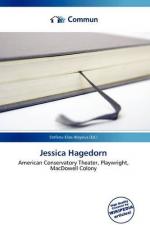|
This section contains 4,546 words (approx. 16 pages at 300 words per page) |

|
SOURCE: Evangelista, Susan. “Jessica Hagedorn and Manila Magic.” MELUS 18, no. 4 (winter 1993-1994): 41-52.
In the following essay, Evangelista explores the elements of magical realism in Hagedorn's writings, particularly as they relate to the author's identity as a Filipina immigrant living in the United States.
In 1975, a then relatively unknown Filipino-American poet named Jessica Hagedorn wrote a poem called “Song for My Father” in which life in Manila took on some of the surreal appearance of life in some Latin-American city under siege:
dope dealers are executed in public and senators go mad in prison camps the nightclubs are burning with indifference curfew draws near soldiers lurk in jeeps of dawn warzones as the president's daughter bogies nostalgically under the gaze of sixteen smooth bodyguards and decay is forever even in the rage of humorless revolutionaries
(Danger and Beauty 37)
The tone of this poem, and of a few other...
|
This section contains 4,546 words (approx. 16 pages at 300 words per page) |

|


